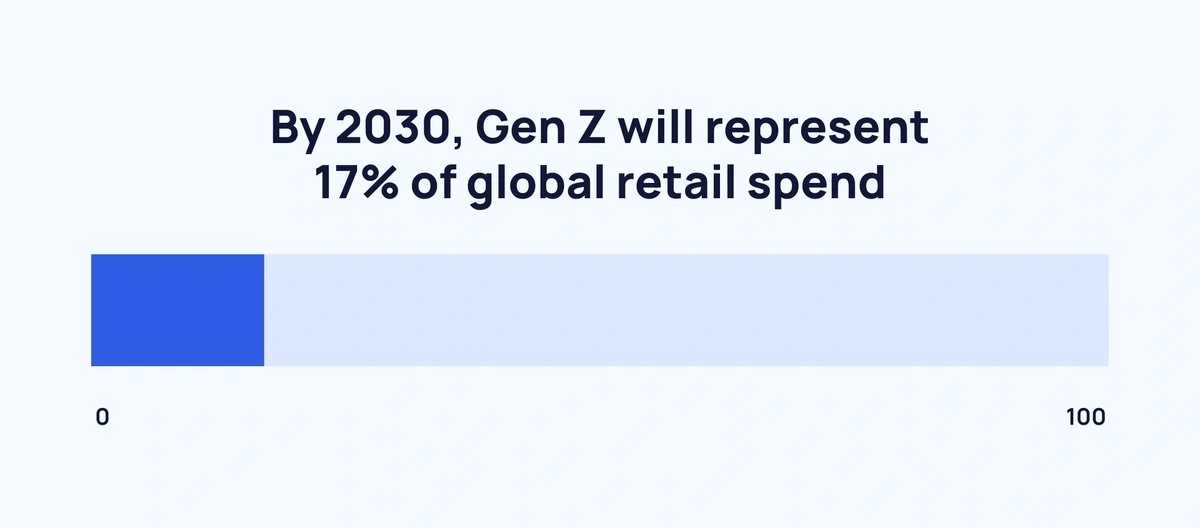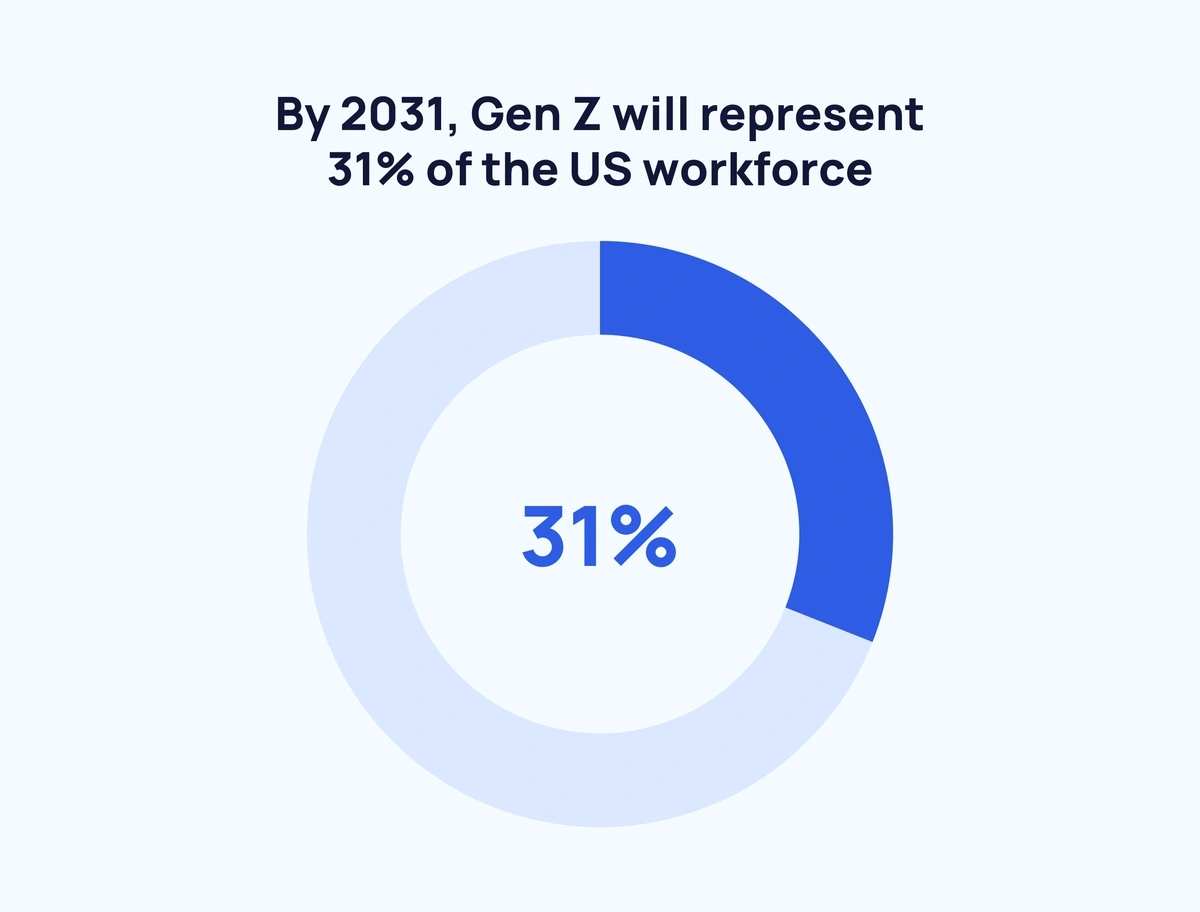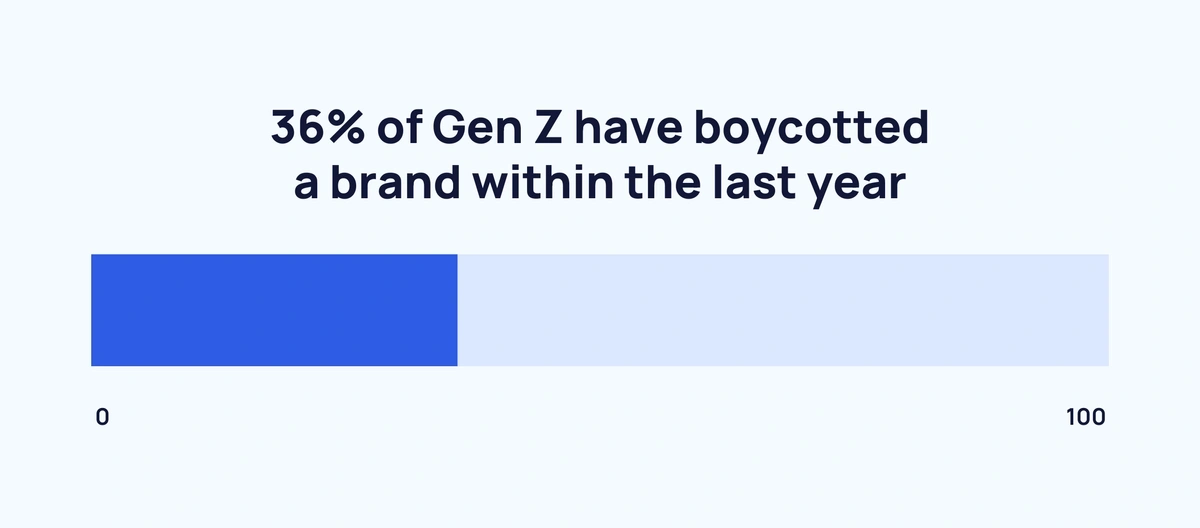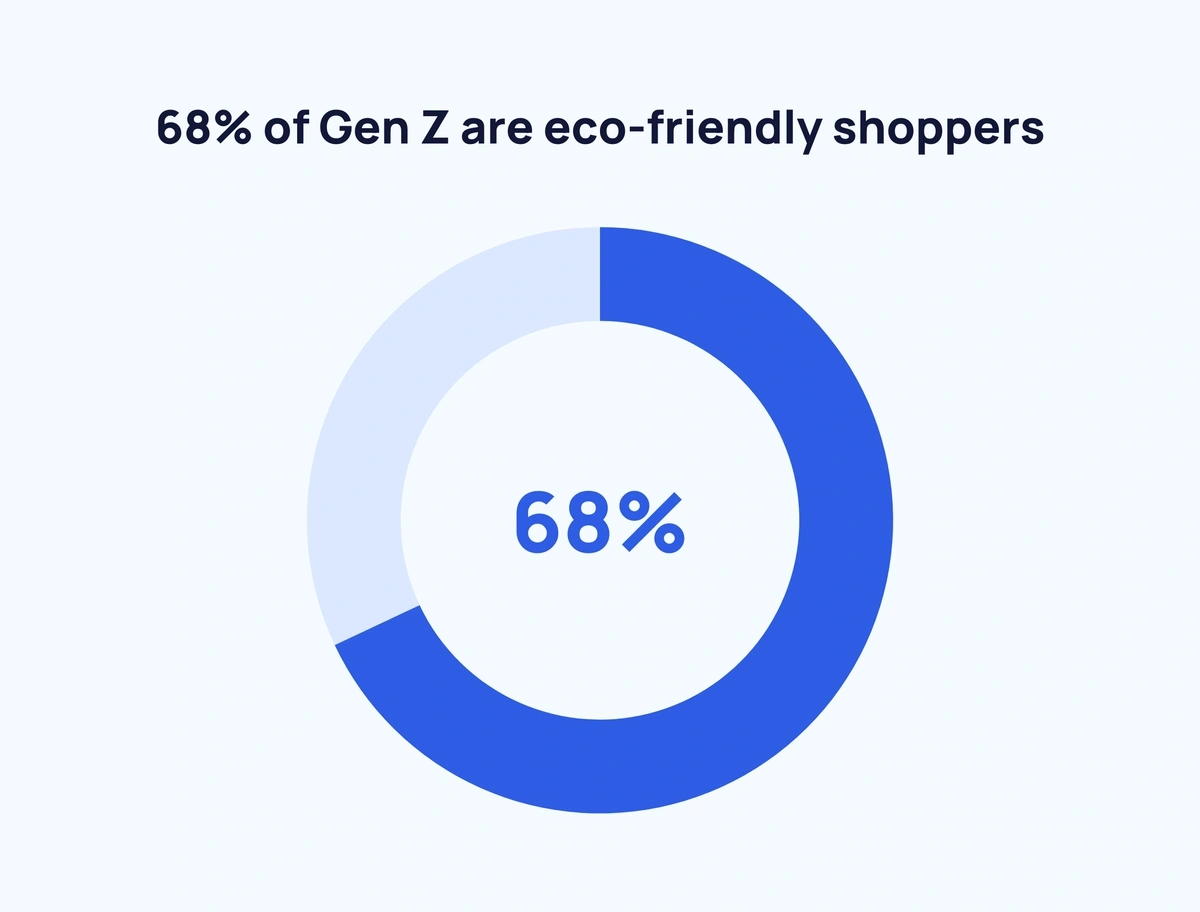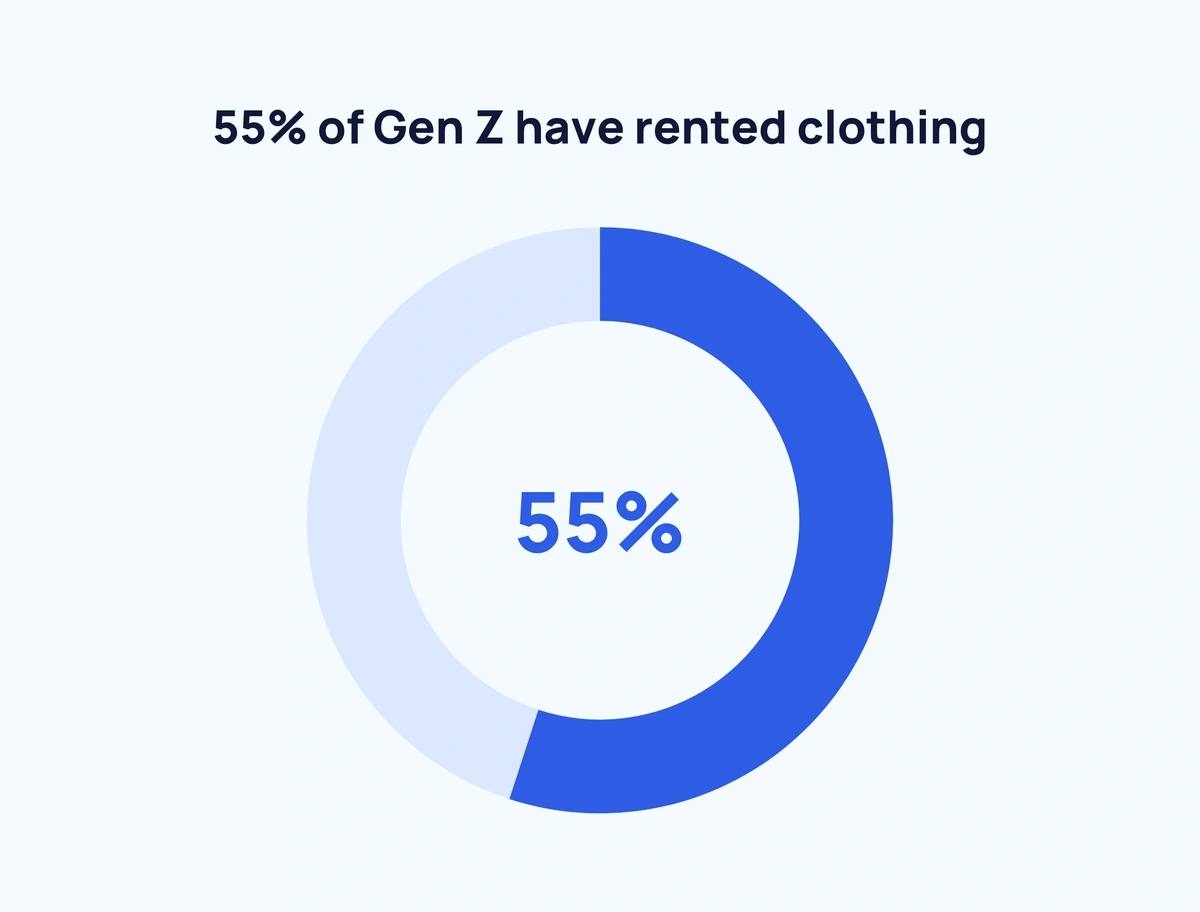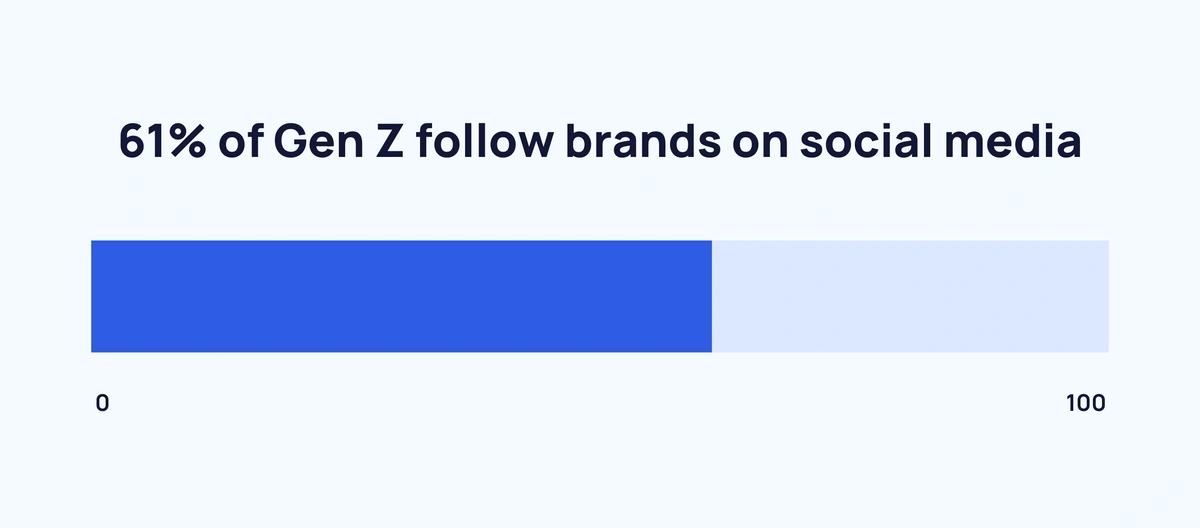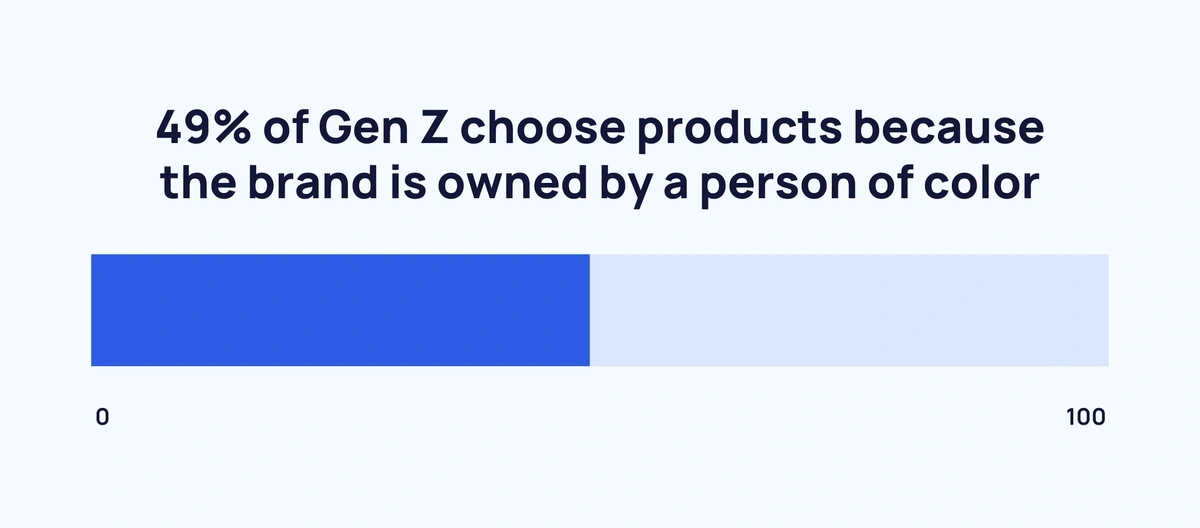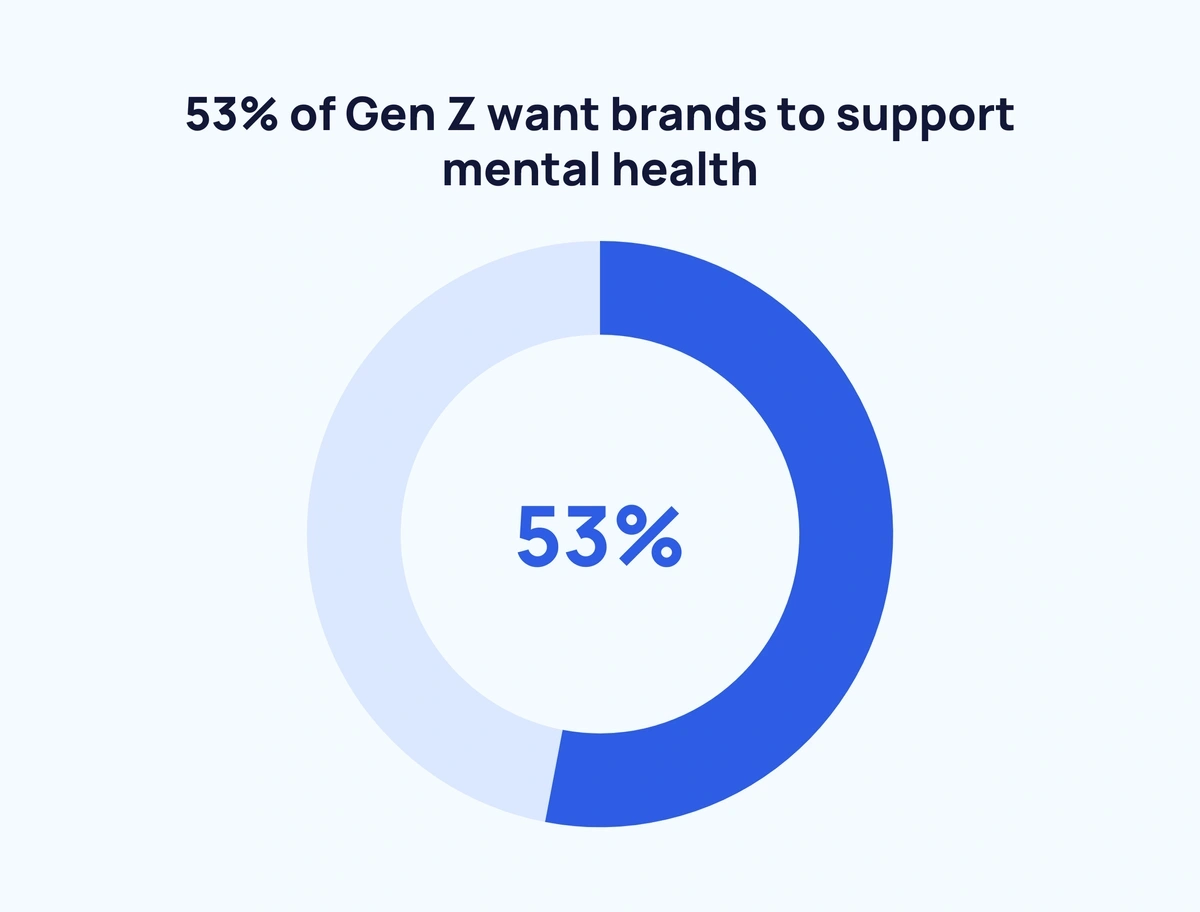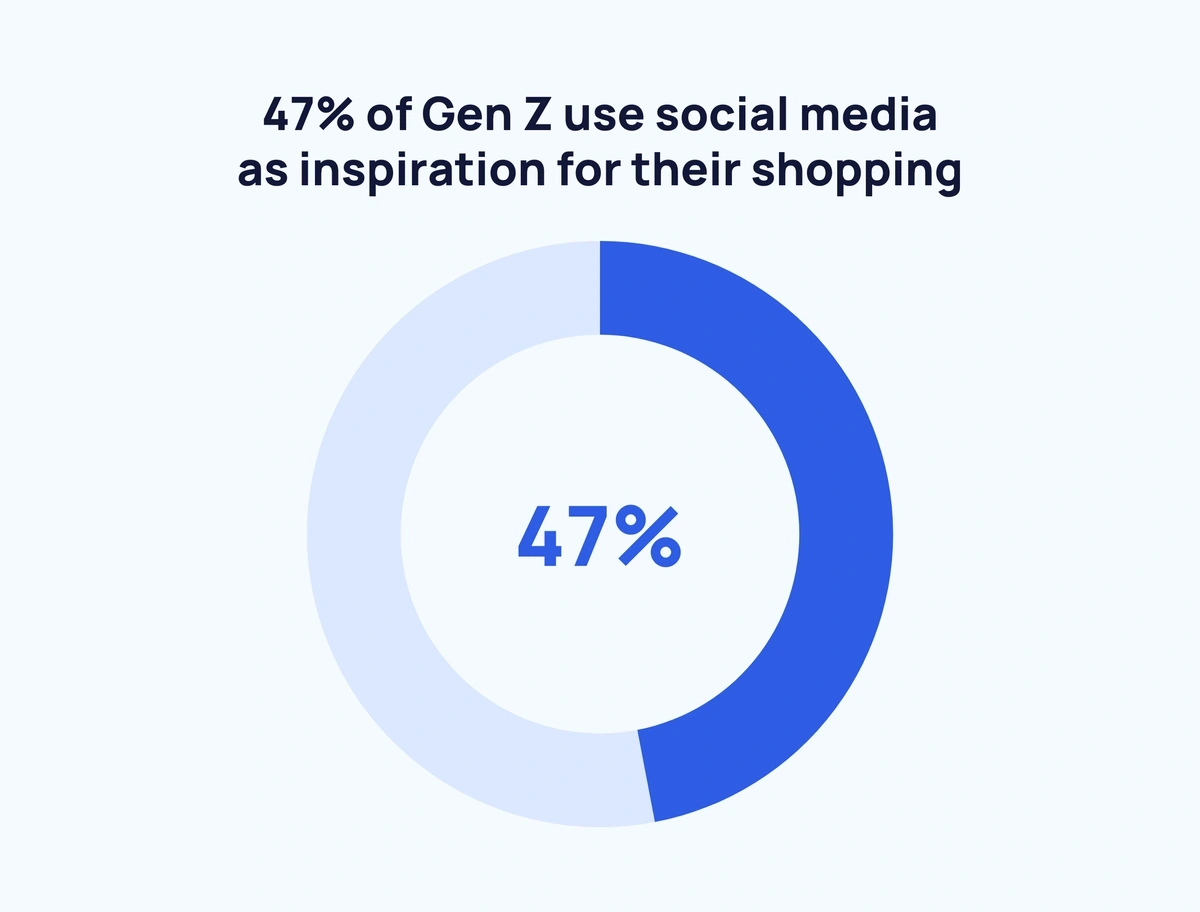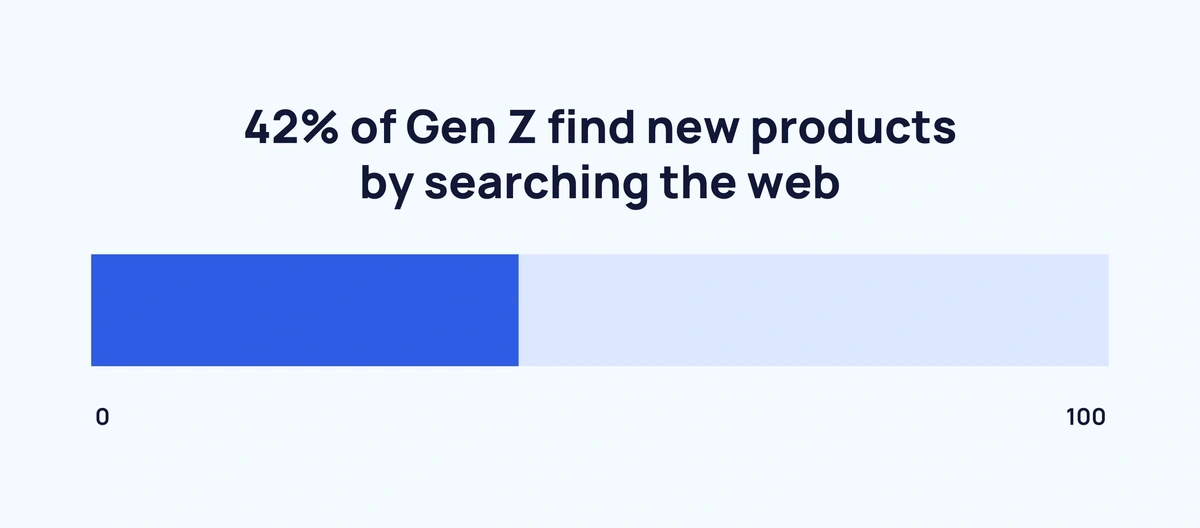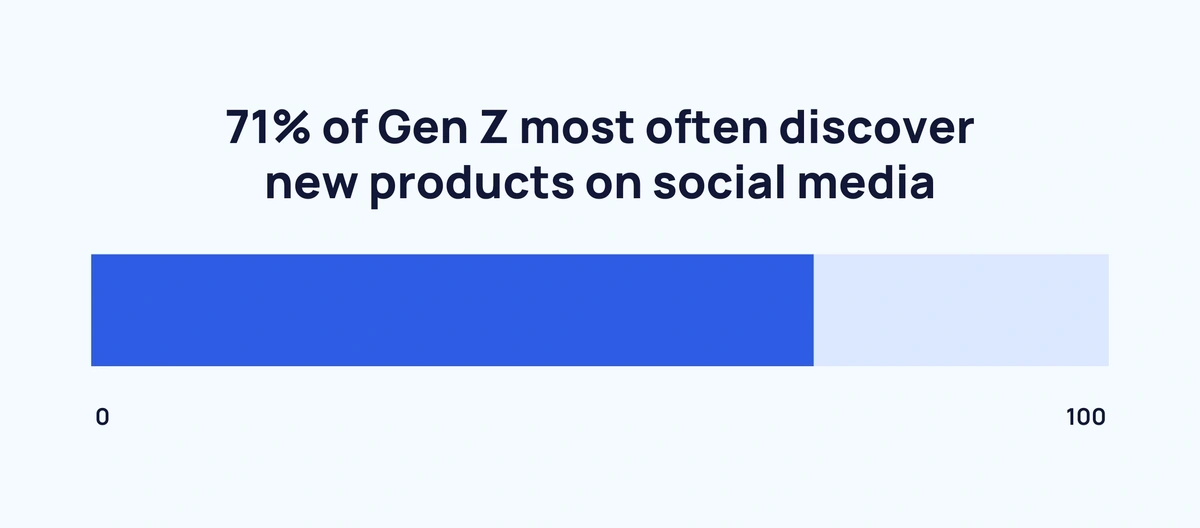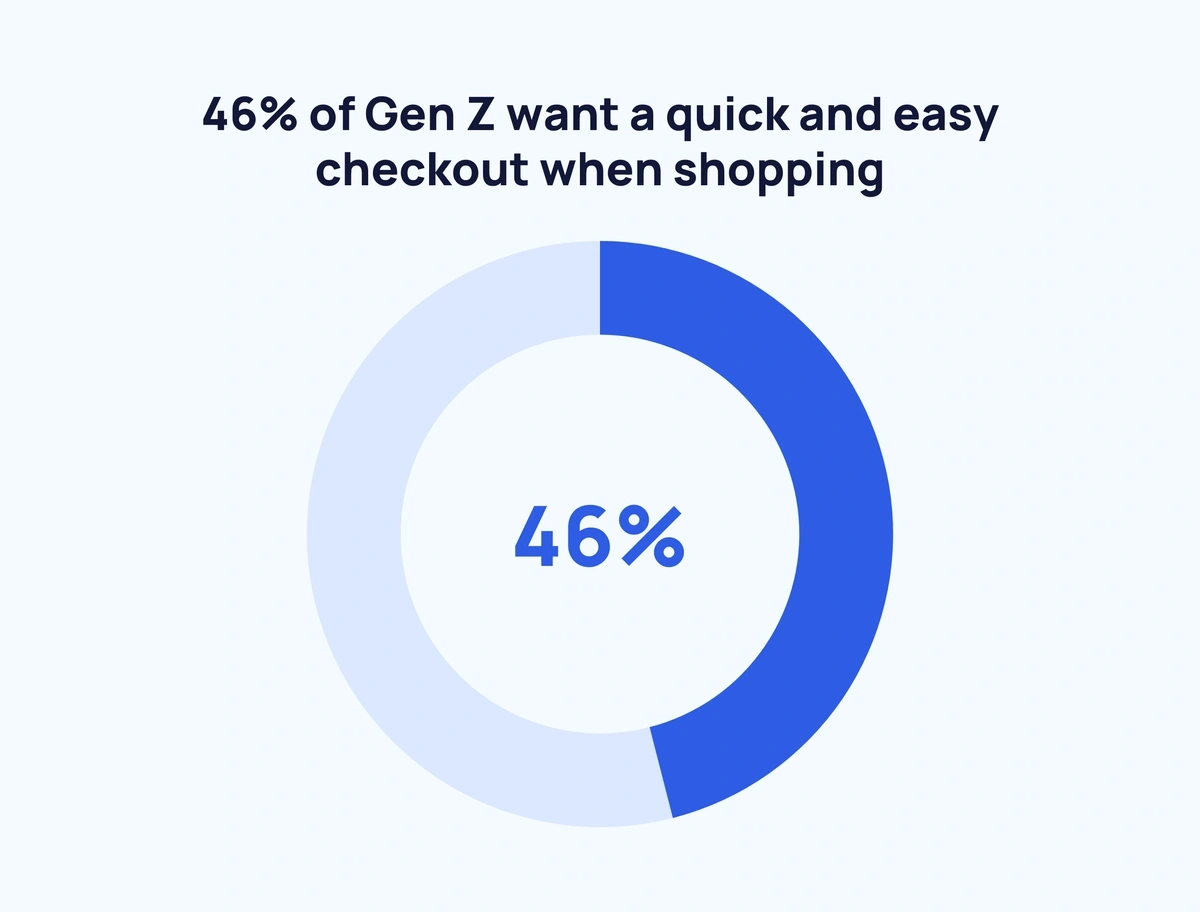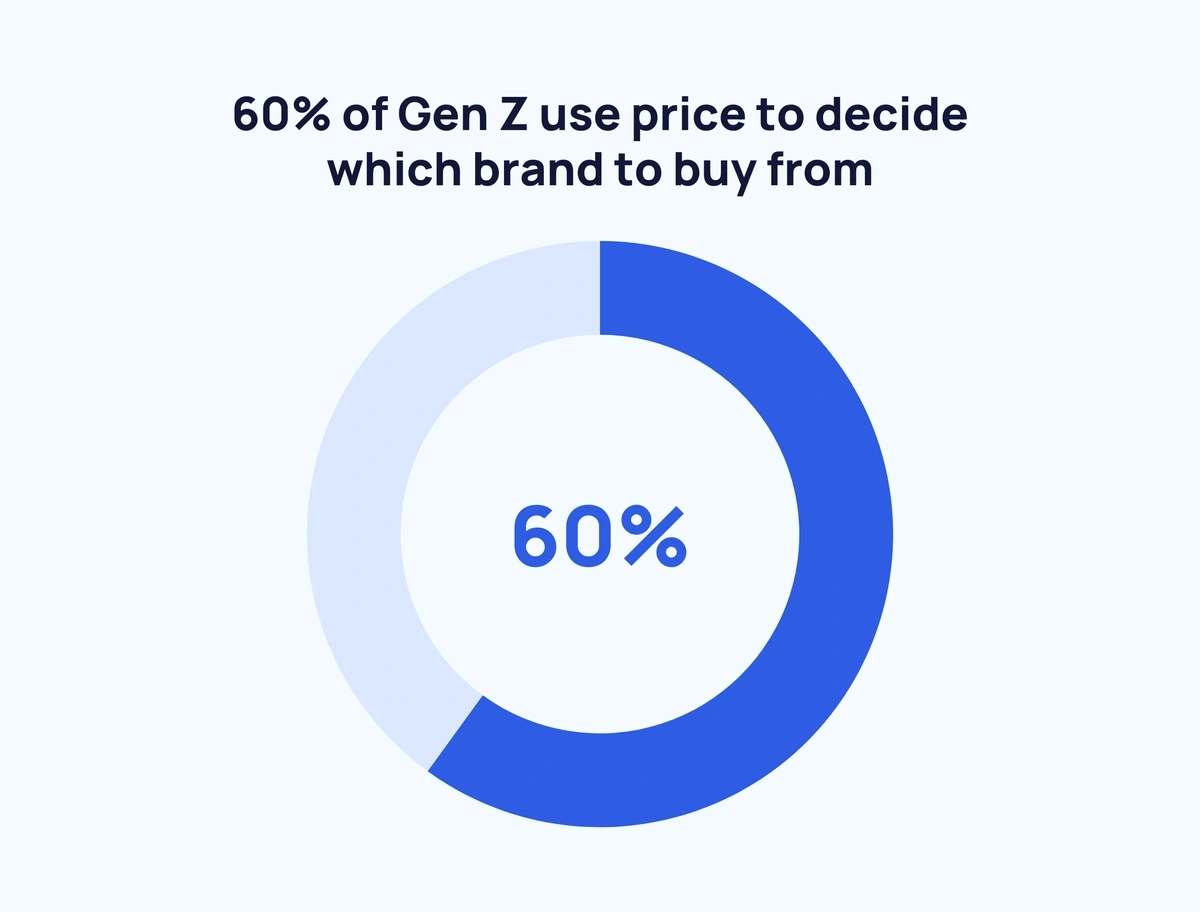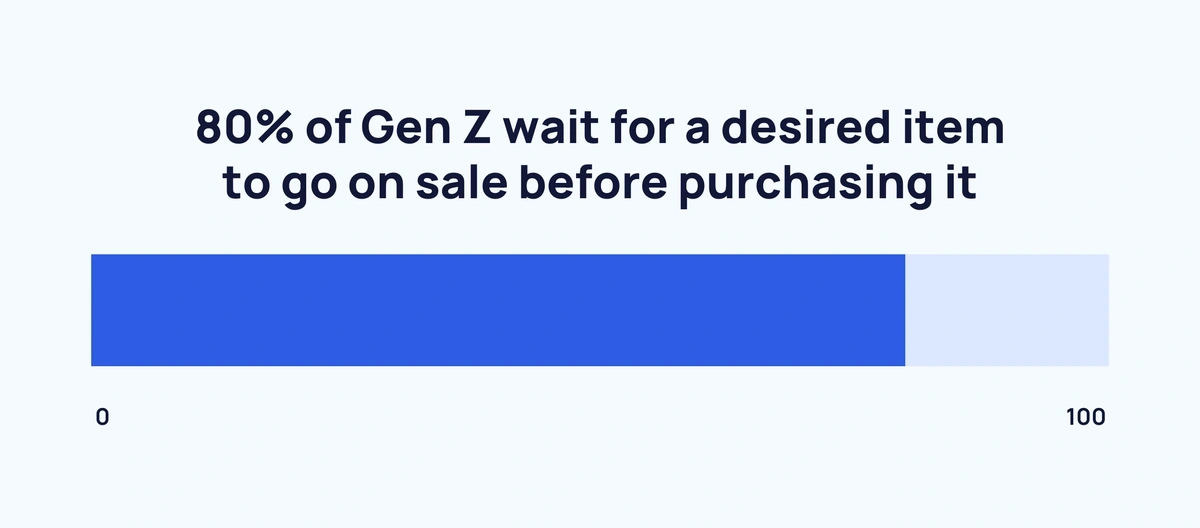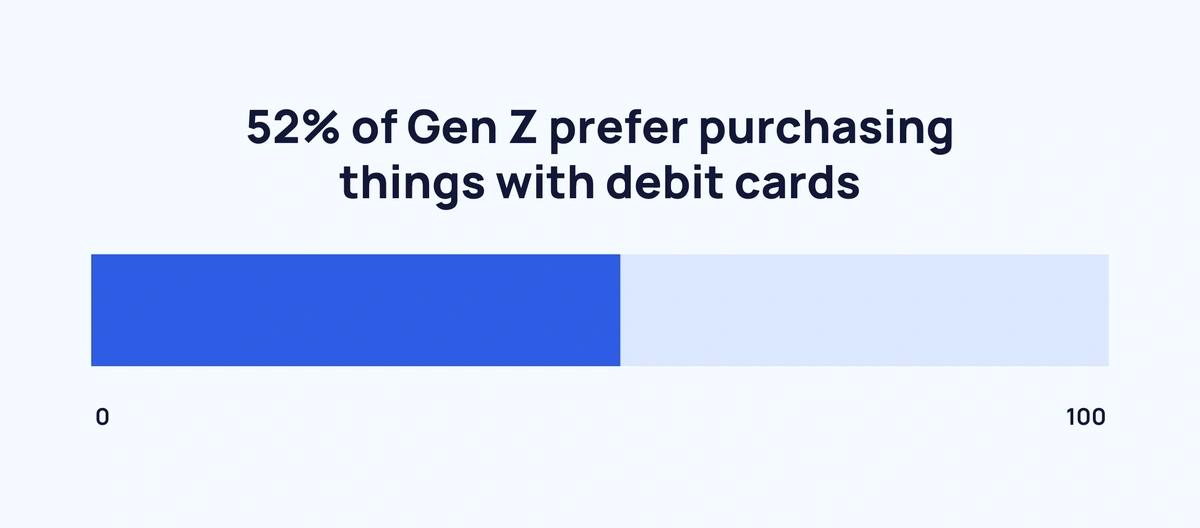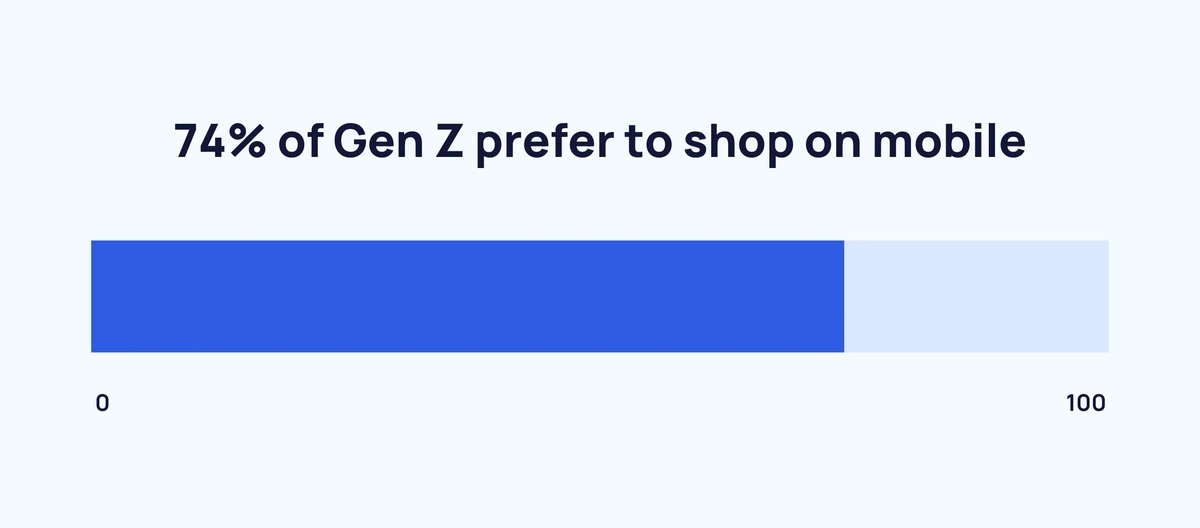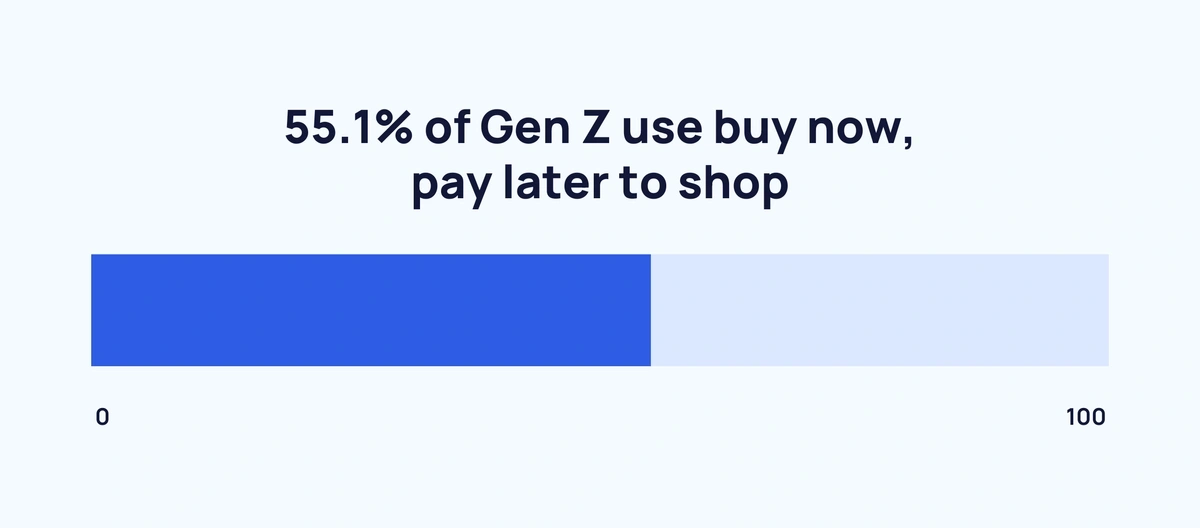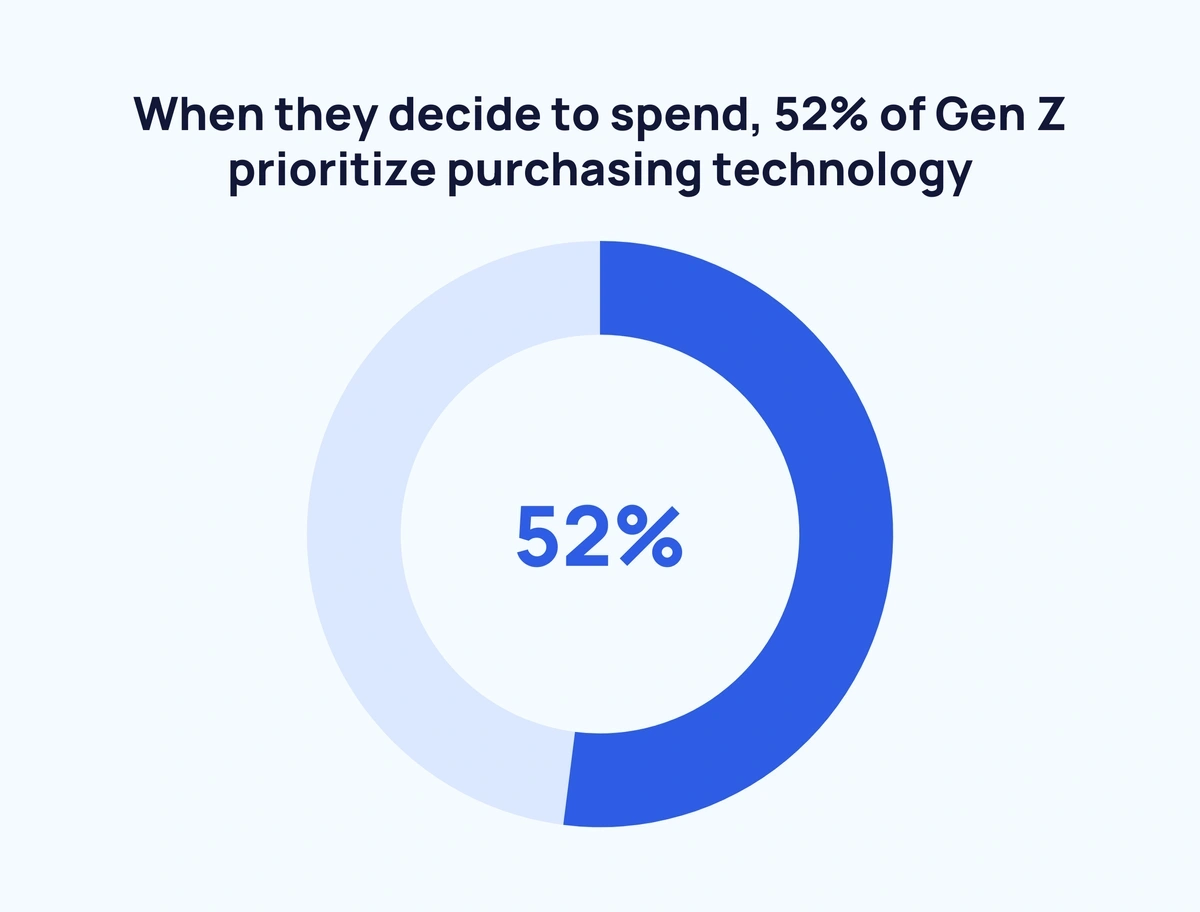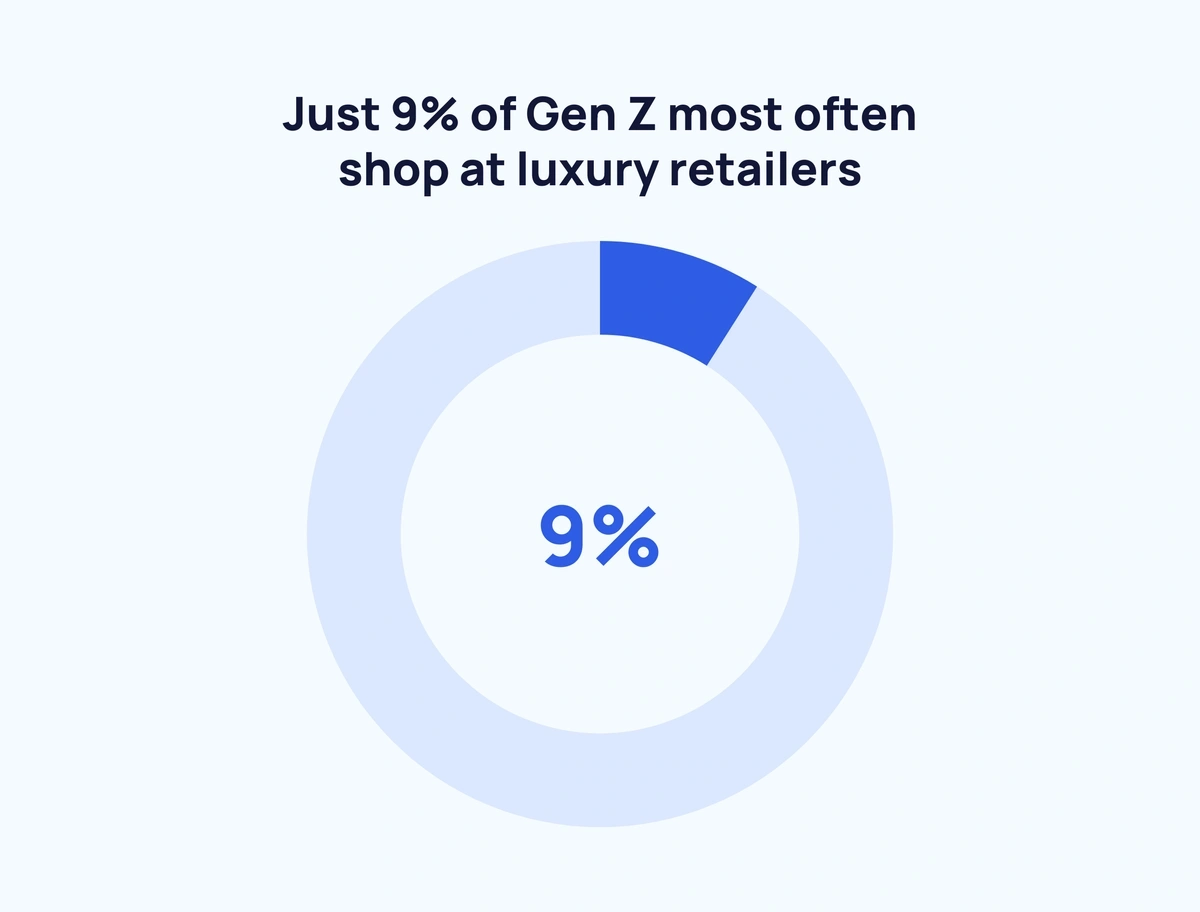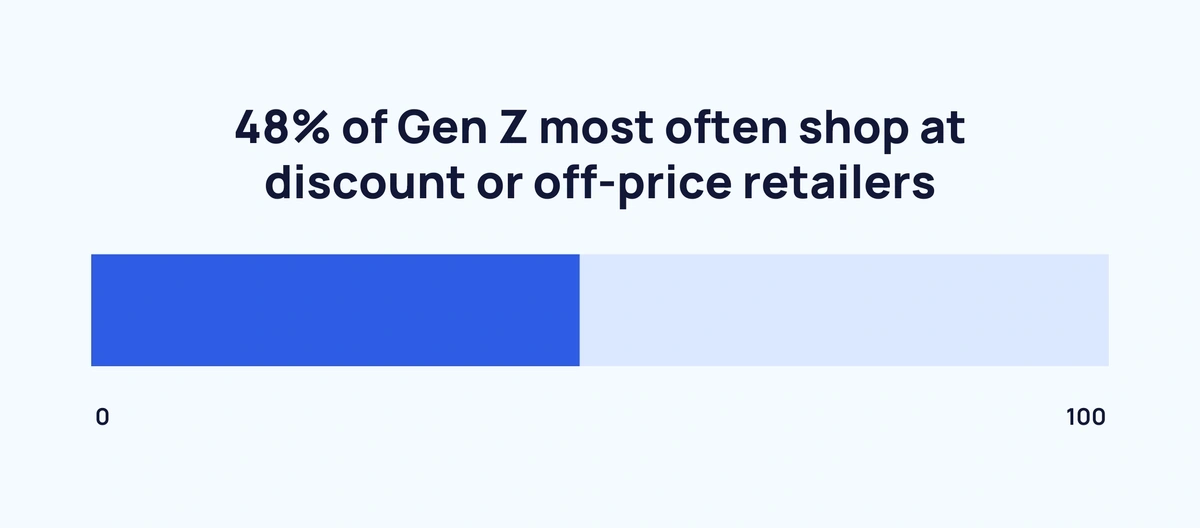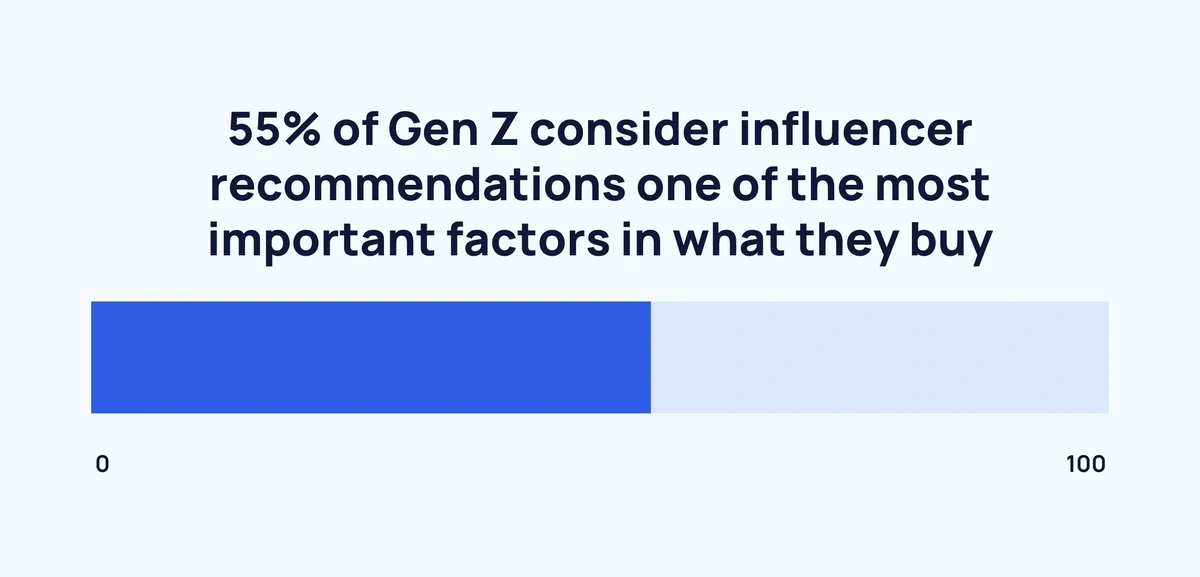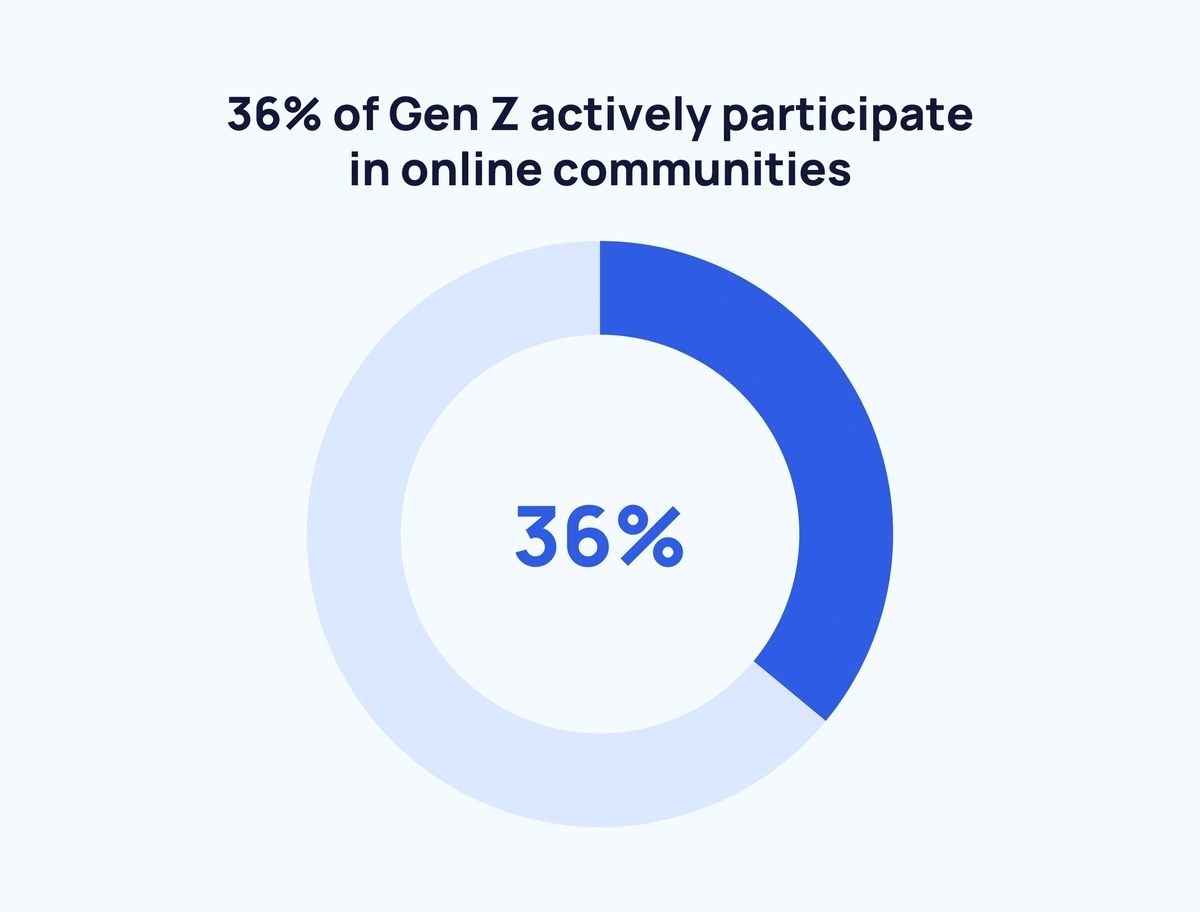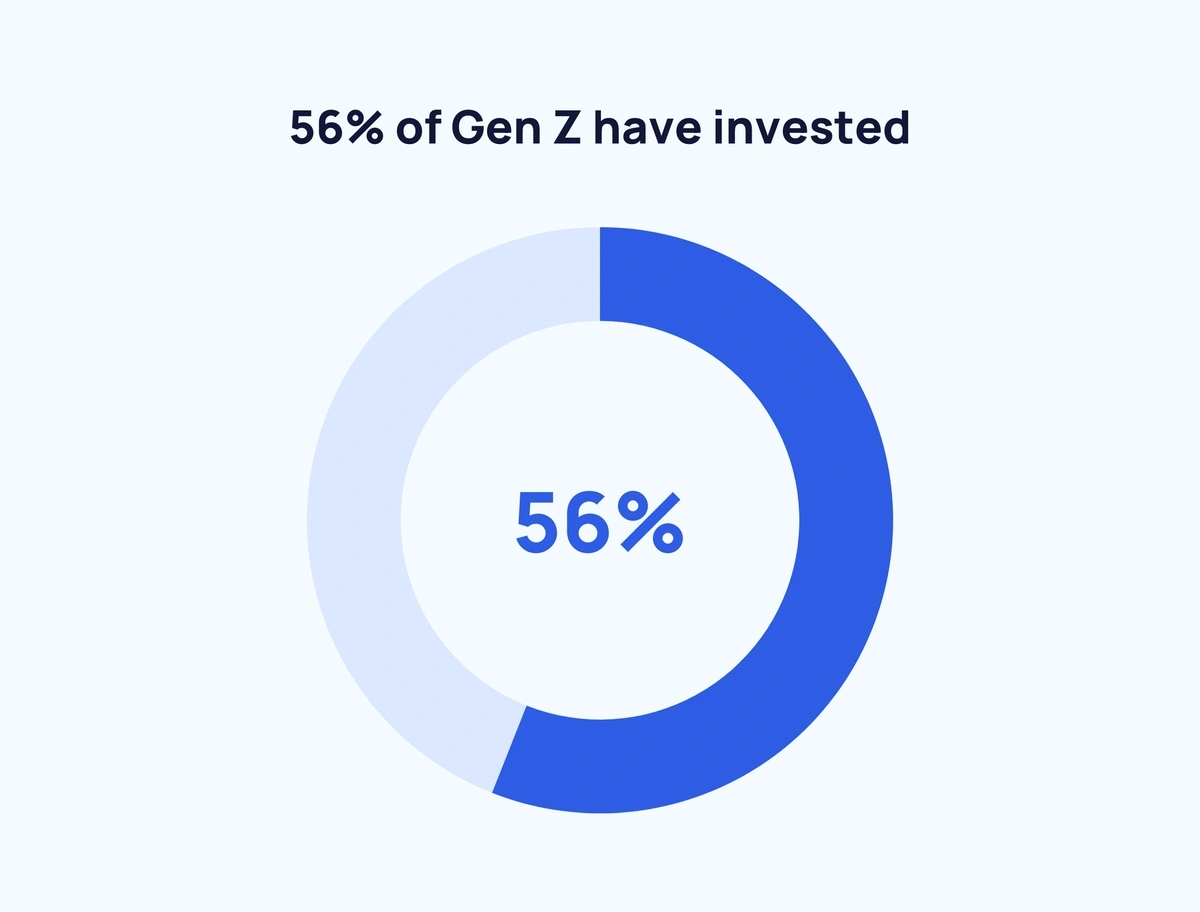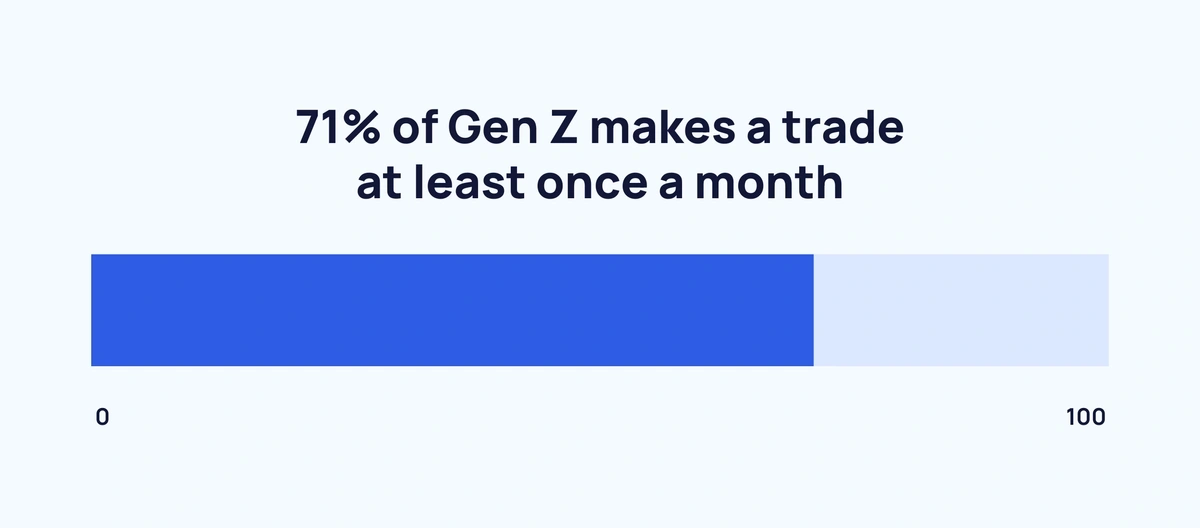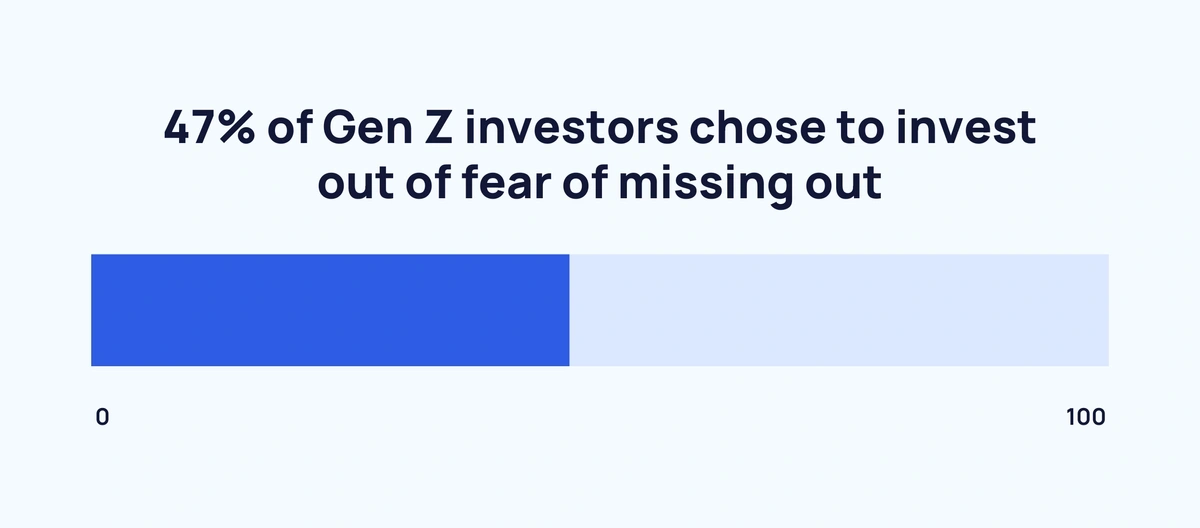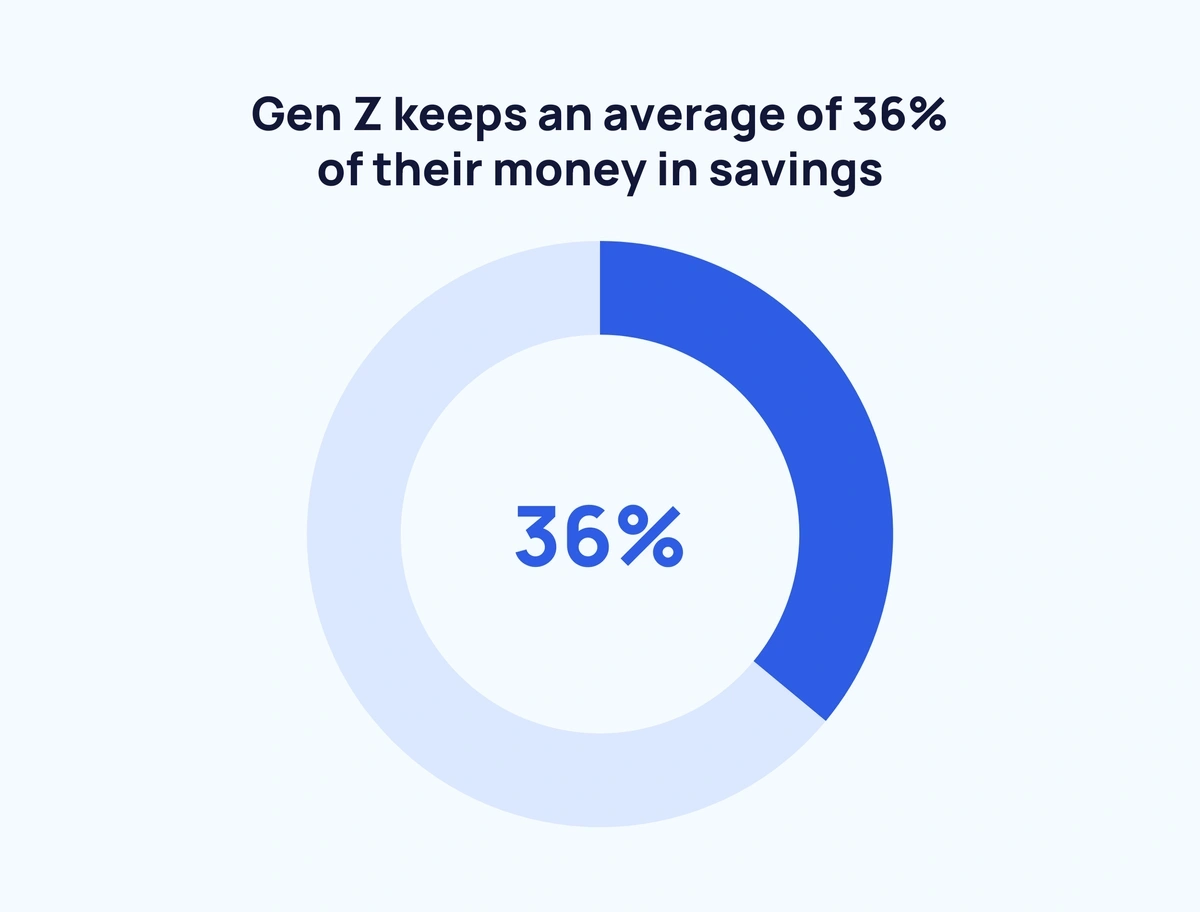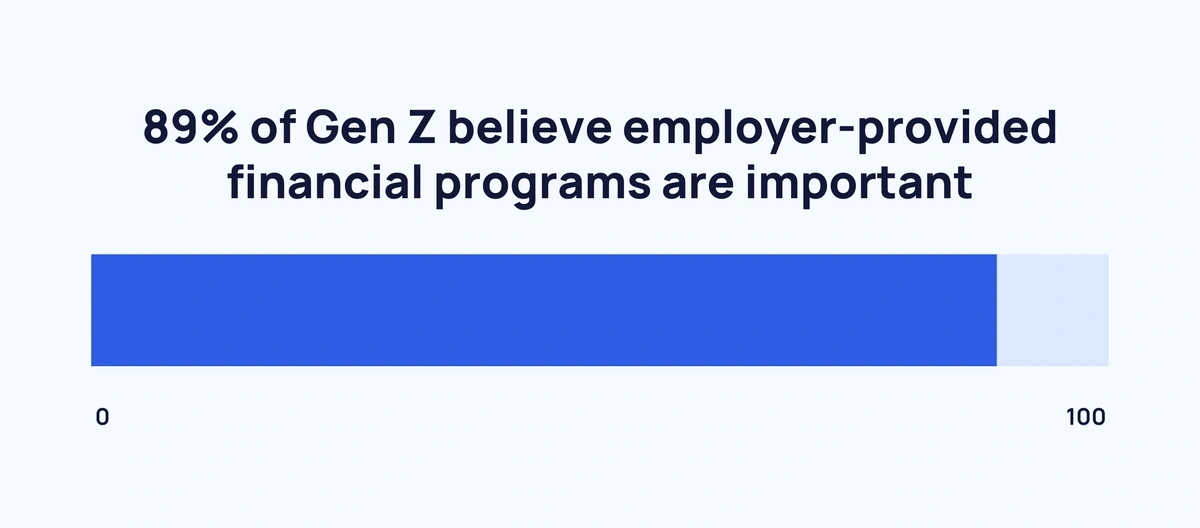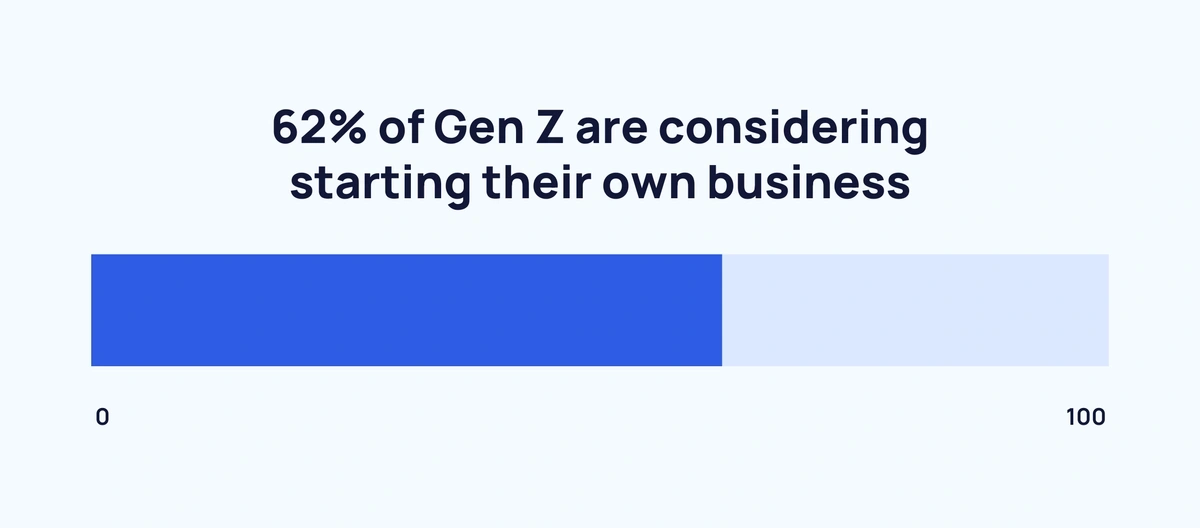Get Advanced Insights on Any Topic
Discover Trends 12+ Months Before Everyone Else
How We Find Trends Before They Take Off
Exploding Topics’ advanced algorithm monitors millions of unstructured data points to spot trends early on.

Keyword Research
Performance Tracking
Competitor Intelligence
Fix Your Site’s SEO Issues in 30 Seconds
Find technical issues blocking search visibility. Get prioritized, actionable fixes in seconds.
Powered by data from
85+ Stats on Gen Z Spending and Buying Habits (2025)
This is a comprehensive list of statistics and trends covering the spending and purchasing habits of Gen Z, updated for 2025.
As Gen Z (aka Zoomers) mature into their maximum earning and purchasing potential over the next several years, brands will need to successfully appeal to this group.
But are the spending habits of Gen Z significantly different to other generations?
In this article, we’ll cover the who, what, how, and where of Gen Z spending.
Key Gen Z Spending and Buying Statistics (Editor’s Picks)
- Gen Z’s global purchasing power is $450 billion
- Gen Z’s purchasing power is expected to reach $12 trillion by 2030.
- 29% of Gen Z are more likely to purchase things from companies with a social media presence
- 41% of Gen Z prefer to discover new things on social media via short-form video
- 55.1% of Gen Z shop with buy now, pay later (BNPL)
- 64% of Gen Z are willing to pay extra to buy from companies they feel loyal towards
- 58% of Gen Z purchased something they saw on social media
- 74% of Gen Z prefer shopping on phones over other devices
Want to Spy on Your Competition?
Explore competitors’ website traffic stats, discover growth points, and expand your market share.
Gen Z’s Spending Power Stats
Gen Z represent $450 billion in spending power (Snapchat)
Despite not having reached their full economic potential yet, Gen Z already represents a huge market. According to the BBC, in the US alone Gen Z represents $360 billion in spending power.
Gen Z’s global spending power is expected to hit $12T by 2030 (NIQ)
This generational cohort currently accounts for 25% of the global population. They're already larger than Millennials and set to be the largest generation ever.
On top of that, Gen Z spends more per capita compared to any other generation at their same age. This is expected to grow even more, and by 2030 Gen Z will have more wealthy people in all major regions of the world.
Gen Z account for 40% of consumers worldwide (Snapchat)
Despite representing only 30% of the population and around a quarter of the workforce, Gen Z makes up an oversized proportion of global consumers.
The expectation that this figure will rise significantly is supported by Gen Z's growth in the workforce. A Semrush study revealed that Gen Z and Millennials make up half of users on primary job sites like LinkedIn and Indeed.
By the end of 2025, online shoppers from Gen Z will outnumber those in Gen X (eMarketer)
Gen Z might already outnumber Gen X in raw terms, but as of now their wealthier elders remain on top in terms of digital spending. However, this is expected to change by the end of 2025 as online shopping becomes even more popular.
Gen Z represents 5% of global retail spend (Afterpay)
Older generations still dominate global spending, but Gen Z is on the rise.
By 2030, Gen Z will represent 17% of global retail spend (Afterpay)
As Gen Z age into greater earning potential, their share of global retail spend will increase. By 2030, Gen Z and millennials could collectively represent 48% of all retail spend.
Gen Z has $360 billion in disposable income (Bloomberg)
$57 billion of that $360 billion figure comes from allowances, the rest from employment.
Gen Z collectively earns $229 billion in wages each year (Gen Z Planet)
The vast majority of that — $193.6 billion — is earned by Zoomers over the age of 20. Those aged between 16 and 19 earn $35.1 billion in wages each year.
By 2031, Gen Z will represent 31% of the US workforce (Oliver Wyman)
In 2022, Gen Z represented just 15% of the US workforce. Over the next decade, they are set to overtake Boomers and Gen X, but will still remain a smaller share of the US workforce than millennials.
The Data Behind Gen Z’s Socially Motivated Spending
36% of Gen Z have boycotted a brand within the last year (Survey Monkey)
While Gen Z are stereotyped as being more politically and socially active than older generations, they are the least likely to have boycotted a brand for its social or political views. In comparison, 40% of Millenials, 42% of Gen X, and 50% of Boomers have boycotted a brand in the last year.
50% of Gen Z believe companies should take a stance on social issues (HubSpot)
Gen Z were far more likely to want brands to publicly declare where they stood on social issues, with just 26% disagreeing. In comparison, 41% of Millennials, 35% of Gen X, and just 25% of Boomers agreed that brands should take a stance on social issues. The divergence in opinions presents a tricky balancing act for brands.
69% of Gen Z want companies to take a stance on racial justice (HubSpot)
Of the issues Gen Z want to see companies take a stance on, racial justice was the most popular. It is followed by LGBTQ+ rights at 50%, gender inequality at 46%, and climate change at 42%.
68% of Gen Z are eco-friendly shoppers (CGS)
Sustainability is becoming a greater concern for consumers regardless of age. Gen Z are leading the pack, with more than two-thirds making an eco-friendly purchase in 2019.
Gen Z is more willing than any other generation to pay 50% or 100% more for sustainable products (CGS)
While 35% of all consumers said they’d be willing to spend 25% more than the original price for a product that is sustainable, Gen Z were the most willing to spend big money to ensure they were being eco-friendly. Consumers considered the materials used by the brand the most important indicator of that brand being sustainable, followed by ethical practices.
60% of Gen Z choose products because they are made by small businesses (HubSpot)
Younger consumers are far more likely to support small businesses. While 59% of Millennials also indicated they choose products because they are made by a small business, just 42% of Gen X and 20% of Boomers said the same.
55% of Gen Z have rented clothing (MDPI)
As people turn away from fast fashion and overconsumption, services that allow users to rent clothing — either on a per-piece basis or as a monthly subscription — are exploding in popularity. The online clothing rental market reached $2.2 billion in 2023, according to IMARC Group.
80% of Gen Z buy things second hand (eBay)
The increasing popularity of “recommerce” is being driven in large part by Gen Z. According to a report by Thredup, a consignment store, the market for second-hand clothing will be worth $84 billion by 2030, over twice the size of fast fashion at $40 billion.
Get More Search Traffic
Use trending keywords to create content your audience craves.
36% of Gen Z buy second-hand goods out of concerns for sustainability and the environment (eBay)
While Gen Z were the most likely to shop second-hand out of a desire to save money, they were also more likely than older generations to do so for the environment.
Gen Z’s Attitudes Toward Brands
61% of Gen Z follow brands on social media (Survey Monkey)
In comparison, just 34% of consumers in older generations follow brands they like on social media. Just 10% of the Silent Generation do so!
29% of Gen Z are more likely to buy from brands with a social media presence (Survey Monkey)
Millennials were about the same, with 30% indicating that a social media presence would make them more likely to purchase from a particular brand. In comparison, just 19% of Gen X, 11% of Boomers, and 6% of the Silent Generation said they would do this.
Brand authenticity is important to 34% of Gen Z, compared to 24% of all shoppers (Survey Monkey)
Gen Z consumers also value brand transparency more than other generations, with 25% of the generation saying it is important in their decision making compared to 16% of all shoppers.
49% of Gen Z choose products because the brand is owned by a person of color (HubSpot)
People of color are still grossly underrepresented among business owners. While Black Americans represent 14.2% of the population, they account for just 2.4% of employer-firm owners, according to research by Brookings. Hispanic Americans are similarly underrepresented. However, firms owned by Black or Hispanic Americans grew between 2019 and 2020 — in part because of Gen Z’s commitment to buying from them when possible.
84% of Gen Z are more likely to buy from a company that treats its workers well (HubSpot)
Gen Z were the most likely to reward good treatment of employees with their money. Just 16% said their decisions would not be impacted by how a company treats its employees. That figure rises to 18% among Millennials, 19% among Gen X, and 28% among Boomers. Still, a hefty 78% of all consumers agreed that they would be more likely to purchase things from employers who treat their employees well.
83% of Gen Z are more likely to buy from brands that they trust with their personal data (HubSpot)
Ranking just below employee treatment on the list of Gen Z concerns is personal data. With major companies frequently in the media for their mishandling of customer data, it’s no surprise that the tech-savvy members of Gen Z are especially wary about how brands use their data.
53% of Gen Z want brands to support mental health (ICSC)
Often lambasted as the “snowflake generation,” the rise in mental illness among Gen Z has naturally led them to consider mental health a crucial advocacy issue. A majority of Gen Z consumers want the brands they buy from to support mental health.
20% of Gen Z stopped buying from a brand in 2023 due to its reputation for sustainability and ethics (Afterpay)
A significant proportion of Gen Z shoppers are willing to put their money where their mouths are in terms of sustainability and ethics. Brands that fail to meet consumer expectations could see their bottom line hurt, undoing any savings gleaned from cutting corners on sustainability or ethics matters,
How Gen Z Decide Where To Spend
47% of Gen Z use social media as inspiration for their shopping (Survey Monkey)
Gen Z uses social media far more than other generations to guide their purchasing. In comparison, 39% of Millenials said they used social media as a source of inspiration for purchases. Just 24% of Gen X, 12% of Boomers, and 6% of the Silent Generation did so.
…but 44% of Gen Z also said they went to physical stores for shopping inspiration, more than any other generation (Survey Monkey)
Gen Z might love social media, but they also love looking around brick-and-mortar store locations. That could be good news to high streets, malls, and other physical locations that have been struggling with reduced traffic in recent years.
51% of Gen Z are more likely to buy food and drink in physical stores (Attest)
Somewhat surprisingly, the balance is the opposite for fashion: 57% of Gen Z prefer shopping for clothing online.
58% of Gen Z have bought something they saw on social media (5WPR)
That’s about in line with the 54% of all consumers who have done so.
41% of Gen Z consider short-form video their preferred way to discover new products on social media (HubSpot)
Short-form video, such as those on TikTok and Instagram Reels, was Gen Z’s preferred way to discover new products on social media. It was followed by ads or sponsored content at 36% and feed posts at 32%. The popularity of short-form video underlines the need for brands to invest in organic video marketing rather than relying on influencers or traditional forms of advertising — if they want to reach Gen Z, anyway.
42% of Gen Z find new products by searching the web (HubSpot)
Video content might be on the rise, but SEO is still incredibly important. 50% of Gen Z most often find new products through search engines, usually on their mobile.
47% of Gen Z use YouTube to research products before purchasing (Survey Monkey)
YouTube was the most popular site for researching products among all generations, but Gen Z used it the most. Facebook was the second most popular site for all generations except Gen Z, who preferred Instagram. While 29% of Gen Z used Instagram, 21% used Facebook.
17% of Gen Z use TikTok to research products before purchasing, far more than any other generation (Survey Monkey)
In comparison, just 8% of Millennials, 3% of Gen X, 0% of Boomers, and 1% of the Silent Generation used the relatively new app. This distribution showcases TikTok’s appeal to younger users.
According to Semrush data, 28.08% of all TikTok users globally are Gen Z (ages 18-28).
71% of Gen Z most often discover new products on social media (HubSpot)
Social media was the most popular source of product discovery among Gen Z. 38% said it was their preferred way to discover new products.
11% of Gen Z consider influencers their most trusted source for product recommendations (Survey Monkey)
Family and friends are the most popular sources for recommendations among all generations, but Gen Z was the most likely to turn to influencers. In comparison, just 7% of Millenials, 3% of Gen X, 2% of Boomers, and 1% of the Silent Generation said that influencers were their most trusted source for purchasing advice. Millennials, Gen X, and Boomers were more likely than Gen Z to turn to online forums.
58% of Gen Z have bought something based off an influencer’s recommendation (Survey Monkey)
Content creators apparently have the most sway among Gen Z. In comparison, 56% of Millenials, 46% of Gen X, and 38% of Boomers purchased an item based on an influencer’s recommendation.
49% of Gen Z buy more clothing because of social media (Survey Monkey)
55% of Gen Z women bought more clothing and 57% bought more skincare due to social media. In comparison, 38% of Gen Z men bought more technology.
What Motivates Gen Z To Spend
30% of Gen Z shop online for convenience, while 20% do so for better prices (ICSC)
Convenience is king when it comes to Gen Z. The ability to order practically anything from your home is the chief driver of online shopping, beating out the ability to find better deals by searching the web.
46% of Gen Z want a quick and easy checkout when shopping (ICSC)
Gen Z considered this the most important feature of the shopping experience. Fast shipping was close behind at 45%, followed by the ability to get anything in-store immediately at 39%. Immediacy and ease-of-use beat out customer service, which just 27% of Gen Z consider important. This reflects the shift in purchasing from an in-person experience to the final step in an often online and often solitary mission.
64% of Gen Z say they will pay more to shop at brands they are loyal to (eMarketer)
Gen Z is the most likely to spend extra in order to support companies they like. While that underscores the need for brands to win them over — perhaps with commitments to sustainability or support for the social causes Gen Z considers important — it’s by no means a guarantee. 71% of Gen Z said they would still purchase from competitors, even if they were loyal to a particular brand.
75% of Gen Z is more likely to purchase something if they can customize it (Business Wire)
In a world with more people than ever, in which influencers are everywhere, customization is king. In order to capture Gen Z consumers eager to stand out from the crowd, brands need to consider their products personalizable.
60% of Gen Z use price to decide which brand to buy from (Business Insider)
Price was, by far, the most important factor determining where Gen Z spent their money. Trailing behind was shared values at 18%, social media presence at 9%, and the influence of friends at 7%. “They are looking for value,” a Gen Z researcher explained to Business Insider, possibly because of their memories of the Great Recession.
47% of Gen Z say they often make impulsive purchases (5WPR)
The likelihood of buying something on a whim declines with age. Just 28% of people over 55 agreed they did this, and some 53% said they did not ever do this.
80% of Gen Z wait for a desired item to go on sale before purchasing it (5WPR)
Gen Z is slightly more sales-savvy, with 76% of all consumers waiting for sales before buying something. That could be a reflection of their youth, with many of their formative memories made during the ravages of the Great Recession.
Just 8% of Gen Z always buy something at first sight if they want it (5WPR)
However, that’s far more than the 3% of those over 55 who would immediately purchase something they saw and liked. Millennials are the most willing to spend immediately, with 11% agreeing that they would purchase something they liked on first sight.
64% of Gen Z buy things second-hand to save money (eBay)
Gen Z were more likely than others to cite financial pressure as a reason for shopping pre-owned and selling their own goods on the resale marketplace.
Just 28.5% of Gen Z consider shopping a chore (Afterpay)
In comparison, 30.88% of millennials and 31.8% of Gen X and above said they thought shopping was a chore.
Gen Z’s Preferred Payment Methods
52% of Gen Z prefer purchasing things with debit cards (Survey Monkey)
In comparison, just 19% prefer using credit to buy things. This preference for debit declines across generations, with older generations more likely to prefer credit to debit.
12% of Gen Z prefer using mobile payment services (Survey Monkey)
Interestingly, Gen Z were no more likely than older generations to use mobile payment services like Apple Pay and Venmo, despite having grown up with mobile technology.
33% of Gen Z have used Venmo or Cash App to buy things in the last year (Survey Monkey)
Apple Pay and Paypal were also popular among Gen Z, with 31% and 30% having used them within the last year, respectively. PayPal was, by far, the most popular among older generations: 41% of Millennials, 46% of Gen X, 40% of Boomers, and 35% of the Silent Generation used it to buy something in the last year.
74% of Gen Z prefer to shop on mobile (HubSpot)
56% of the 1,000+ individuals surveyed by HubSpot used mobile phones more than any other device to look up questions. The increasing dominance of mobiles shows how important mobile optimization is for brands.
28% of Gen Z buy products directly from social media apps (HubSpot)
That’s the same percentage as Millennials. Gen X and Boomers were far less likely to purchase things directly from social media apps, with 18% and 4% doing so, respectively.
55.1% of Gen Z use buy now, pay later to shop (eMarketer)
Gen Z are the most likely to use alternative payment methods while shopping. That’s not surprising, as BNPL is a way for younger consumers without credit to finance certain purchases.
Gen Z accounts for 14% of spending on Afterpay (Afterpay)
The concept of buying something now and paying for it later is growing among younger generations. While Millennials are the biggest users of buy now, pay later, Gen Z is the fastest growing group of Afterpay users. Fashion is by far the most popular category of purchase on Afterpay, accounting for 80% of the money Gen Z spends on the service.
What Gen Z Spend Their Money On
When they decide to spend, 52% of Gen Z prioritize purchasing technology (5WPR)
Electronics are pricey, so it’s unsurprising that they were the most popular choice for a splurge purchase among all generations. However, Gen Z diverges from older generations with its second choice: 37% chose health and wellness products, where other generations chose travel and experiences as their second choice for a splurge. 36% of Gen Z chose personal care items, like cosmetics, while older generations were more likely to splurge on dining out or home goods. Gen Z’s aversion to travel is likely a reflection of its youth; this may well change as members grow older.
46% of Gen Z spent more on fashion than anything else in 2022 (5WPR)
Gen Z was the only generation to have clothing and fashion as their top spending category. 30% of Gen Z spent more on beauty and personal care than anything else, far more than any other generation.
75% of purchases made by Gen Z are in fashion (UKPOS)
In comparison, 65% of purchases made by millennials are in the fashion industry.
Gen Z are 2.6 times more likely to buy clothing every week than other generations (Oliver Wyman)
That could be due to social media and the pressure to keep up with others. According to Oliver Wyman’s research, Gen Z are also 16% less likely than other generations to be satisfied with their face and body.
Just 9% of Gen Z most often shop at luxury retailers (ICSC)
Retailers like Ralph Lauren were the least likely to be frequently patronized by Gen Z. This might change as the still-youthful generation reaches its full earnings potential over the next several years.
36% of Gen Z enjoy purchasing things to display their beliefs (5WPR)
Gen Z was the most likely to do this. In comparison, just 12% of those over 55 do so.
48% of Gen Z most often shop at discount or off-price retailers (ICSC)
Gen Z was most likely to shop at discount retailers like Target and T.J. Maxx, a possible reflection of their caution around money.
Gen Z’s Attitude Toward Influencers
30% of Gen Z consider themselves content creators, and 26% consider themselves influencers (HubSpot)
Despite Gen Z’s reliance on influencer recommendations, fewer consider themselves content creators and influencers than Millennials. Among that generation, 38% consider themselves content creators and 29% consider themselves influencers. That could be because Gen Z is yet to fully mature. It’s important to note, though, that the vast majority of these self-described influencers and creators — 84% — have 10,000 or fewer followers. 39% have 1,000 or fewer!
55% of Gen Z consider influencer recommendations one of the most important factors in what they buy (HubSpot)
Overall, just 30% of consumers consider this an important factor in their spending decisions. (A whopping 0% of Boomers consider influencers when making purchase decisions.) However, 78% believe marketing videos should be relatable and authentic, rather than highly polished.
16% of Gen Z agree that their favorite purchases were worn or used by famous people (5WPR)
That’s more than consumers overall, of whom just 11% agreed with this. However, Millennials were more likely to be influenced by the rich and famous, with 21% agreeing. Does this mean influencers are becoming less, well, influential?
Gen Z’s Online Spending Habits
36% of Gen Z actively participate in online communities (HubSpot)
Gen Z are the most likely to participate in these communities. The three top benefits of these communities, according to respondents, are learning new things, getting ideas and inspiration, and meeting others with similar interests. All this underscores the growing importance of online spaces to brands looking to reach younger consumers.
77% of Gen Z agree that online shopping lets them buy products from small or new businesses not available in physical stores (5WPR)
Gen Z were the most likely to consider online shopping a chance to find products that are generally unavailable in stores. In comparison, 65% of all consumers agreed with this sentiment. Gen Z were also the most likely to strongly agree with this idea, with 32% responding as such.
11% of Gen Z have purchased something directly from a brand’s Instagram page multiple times (5WPR)
19% of all Instagram users have done this at least once.
Gen Z’s Investing Habits
56% of Gen Z have invested (CFA Institute)
The rise in online investment advice might be responsible for the high number of young investors.
34% of Gen Z said they would likely buy stocks (Logica)
Perhaps influenced by the rise in online finance content creators, Gen Z were the most likely to say they would purchase stocks between June 2023 and 2024.
19% of Gen Z are only invested in crypto or NFTs (CFA Institute)
The hype cycles that often surround cryptocurrency and NFTs might be why such a significant proportion of Gen Z has chosen to invest solely in them, eschewing more traditional — and often safer — avenues of investment. Crypto is the most popular choice for Gen Z investors, with 55% of them choosing to invest in cryptocurrency.
71% of Gen Z makes a trade at least once a month (Motley Fool)
12% of Gen Z makes a trade every day. Millennials are slightly more trade-obsessed, with 50% trading at least once a week.
Gen Z has invested a median of $4,000 (CFA Institute)
For Gen Z men, the median invested is $5,000, compared to $3,000 for women. There’s a similar divide between the median investment among white members of Gen Z ($5,000) and people of color ($2,000).
37% of Gen Z own individual stocks (Motley Fool)
In comparison, 55% of millennials own individual stocks.
47% of Gen Z investors chose to invest out of fear of missing out (CFA Institute)
FOMO is a significant factor influencing Zoomers to start investing. However, it was only the eighth most common reason cited by Gen Z investors. The most common was being able to start investing with small amounts of money, with 67% of Gen Z investors saying this was why they started investing. Following that was curiosity, obtaining the money to invest, and the influence of a family member.
Gen Z’s Saving Habits
42% of Gen Z are saving more than before (Logica)
According to Logica’s December 2023 Future of Money study, a significant proportion of Gen Z are saving more than they were six months before. Gen Z are also more focused on saving than other generations. Just 26% of all consumers said they were saving more, and 33% indicated they were saving less.
Gen Z keeps an average of 36% of their money in savings (Logica)
In comparison, the average amount of money kept in savings was 26% across all generations.
23% of Gen Z believe their retirement savings are ahead of where they should be (Bankrate)
Gen Z were the most confident about the state of their savings. However, they were also the most likely to have not saved anything — 29% were not contributing to their retirement savings at the time of the survey, in August 2023 — meaning this confidence could be misplaced.
Miscellaneous Gen Z Spending & Buying Statistics
89% of Gen Z believe employer-provided financial programs are important (Logica)
Gen Z were the most likely to believe their finances should be supported by their employers. If employers heed this call, they could boost the ability of Gen Z to reach their financial goals — which, of course, include purchasing various things.
21% of Gen Z have used ChatGPT, but most of them wouldn’t use it for financial advice (Logica)
Just 11% of consumers said they would use an AI tool for advice on how to manage their money, a reflection of general distrust toward AI’s ability to be accurate. 54% said they would never use AI tools for financial advice.
47% of Gen Z bought a subscription for a physical product in 2023 (HubSpot)
Gen Z were the most likely to have purchased such subscriptions. However, 59% of Gen Z preferred to buy things at full price, rather than subscribing to a recurring service. Subscriptions might be on the rise, but consumers apparently still prefer paying for what they need, when they need.
51% of Gen Z have tried bracketing at least once (Civic Science)
Bracketing is the practice of buying more than one copy of the same product, with the intention of trying them all and returning the ones you don’t want to keep. Gen Z is the most likely to do this, with 25% having done so more than twice. The prevalence of this technique among the otherwise eco-conscious generation is interesting, considering the deleterious impact increased returns have on the environment.
62% of Gen Z are considering starting their own business (Business Wire)
Of those planning on starting or potentially starting a business, 62% said they would start it online. Such a willingness to spend on things needed to start a business represents an interesting marketing opportunity.
28% of Gen Z are interested in virtual shopping (Snapchat)
One of the many ways AI and VR are set to revolutionize our lives is through how we shop. The idea of virtually shopping with friends is most popular among Gen Z — unsurprising, considering their familiarity with the online world. 22% of all shoppers expressed interest in the concept.
88% of Gen Z believe they can spot a trend (5WPR 2021)
Gen Z’s social media savvy makes them confident they can stay up-to-date with the latest trends. In comparison, 45% of those aged 55 and up admit they can’t spot new trends.
67% of Gen Z consider social media content their top definition of “word-of-mouth marketing” (5WPR 2023)
Overall, consumers still consider recommendations from friends and family members to be word-of-mouth marketing, with 71% considering this the definition of the term. Gen Z, however, apparently considers things heard over social media to be word-of-mouth, an important lesson for marketers looking to tap into a new generation of consumers.
Conclusion
Gen Z is still years away from maturing into its full earning and spending potential. However, it’s already a force that brands must reckon with if they want to stay competitive.
That doesn’t mean total marketing overhauls. As the stats above show, Gen Z shares more with its predecessors than you might expect. Take Gen Z’s fondness for shopping in brick-and-mortar stores, for example.
However, keeping up with the Zoomers will require recognition that they unashamedly have their own priorities. Gen Z wants brands to take stands on social issues. It’s prepared to reward sustainable and ethical business practices. Zoomers pay attention to the opinions of their online communities and are more interested in short-form video than tried-and-tested marketing techniques.
If you’d like to learn more about generational consumer habits, read our guide to Generation Alpha.
Stop Guessing, Start Growing 🚀
Use real-time topic data to create content that resonates and brings results.
Exploding Topics is owned by Semrush. Our mission is to provide accurate data and expert insights on emerging trends. Unless otherwise noted, this page’s content was written by either an employee or a paid contractor of Semrush Inc.
Share
Newsletter Signup
By clicking “Subscribe” you agree to Semrush Privacy Policy and consent to Semrush using your contact data for newsletter purposes
Written By


Josh is the Co-Founder and CTO of Exploding Topics. Josh has led Exploding Topics product development from the first line of co... Read more





